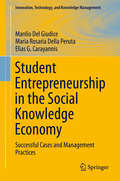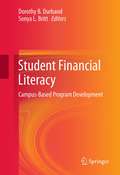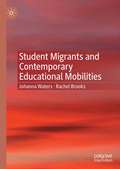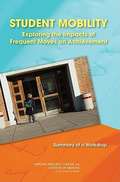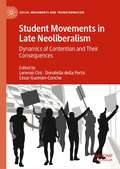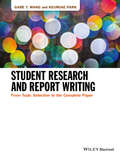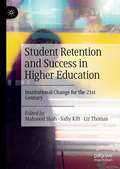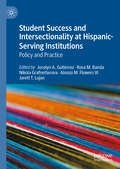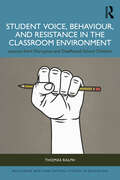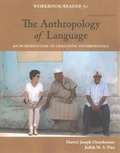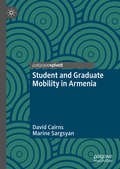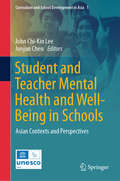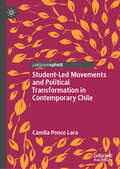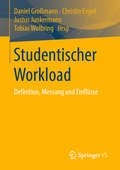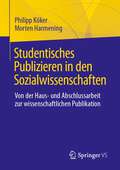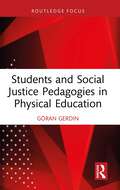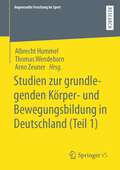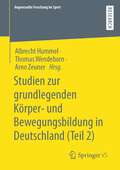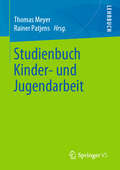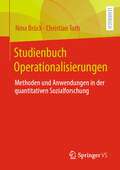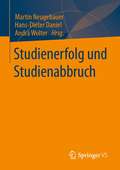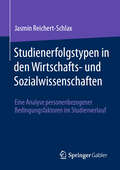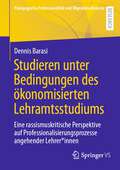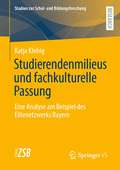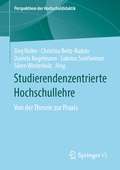- Table View
- List View
Student Entrepreneurship in the Social Knowledge Economy
by Maria Rosaria Della Peruta Manlio Del Giudice Elias G. CarayannisTraditionally, the study of entrepreneurial behavior focuses on such factors as (i) the personality characteristics that distinguish the entrepreneur from non-entrepreneur and (ii) demographic characteristics such gender, age, familiar antecedents and education. With particular respect to investigating the development, acquisition, and dissemination of entrepreneurial skills and behaviors, the authors focus on the university environment, as a locus of research and innovation, where students are exposed to a wide variety of influences that are enhanced by a high degree of connectivity. The underlying theme of this volume is to develop our understanding of the sociology of student entrepreneurial behavior and in doing so attempt to synthesize literature investigating individual talent with the literature on concurrent knowledge sourcing in the pursuit of entrepreneurial activities. Specifically, the authors investigate the degree to which access to diverse knowledge (in addition to such psychological characteristics and tolerance of ambiguity and risk taking) influences the nature and probability of entrepreneurial success. Moreover, they explore the role of social media and social networking in facilitating access to distributed and disparate information and knowledge Their research addresses such timely questions as: Where do entrepreneurial opportunities come from? How can higher education best stimulate the creation of firms emanating from young and smart minds in colleges and universities? What is the value of MOOCs for frequent, early, and "thick" communication among the various specialties needed to accomplish entrepreneurial projects? How do we know whether social media affect students' responses to new knowledge and new ideas? To what extent do educational practices affect racial and ethnic differences in student entrepreneurship? What is the role of the indigenous minority student entrepreneur in establishing high-technology firms? The result is a multi-dimensional approach that sheds light on the dynamics of education, knowledge creation, social networking, innovation and new business development.
Student Financial Literacy
by Sonya L. Britt Dorothy B. DurbandCollege students are particularly vulnerable to making poor financial decisions. One method of addressing personal finances and financial stress among students of higher education is through university based financial education programs. Student Financial Literacy: Program Development presents effective strategies to assist in the implementation or the enhancement of a program as a tool to improve students' educational experience and financial well-being. It presents the key components of financial education programs designed to address the growing concerns associated with high levels of debt and low levels of financial literacy among college students.
Student Migrants and Contemporary Educational Mobilities
by Rachel Brooks Johanna WatersThis book explores questions around the meaning and significance of international student migration. Framed in relation to the mobilities – and immobilities – of international students, the book highlights various key themes emerging from the rich interdisciplinary scholarship in this area, including socio-economic diversification in mobile students, the differential value of international higher education, and citizenship and state-building projects. It also discusses the importance of considering ethics in relation to student migrants. This pioneering book will be of interest and value to scholars of student mobilities and the international student experience more widely, as well as practitioners and policy makers.
Student Mobility: Exploring the Impacts of Frequent Moves on Achievement
by National Research Council Institute of Medicine of the National AcademiesMany low-income families struggle with stable housing and frequently have to move due to foreclosures, rent increases, or other financial setbacks. Children in these families can experience lasting negative effects, especially those who are young and still developing basic learning and social skills. A joint NRC-IOM committee held a workshop in June 2009 to examine these issues, highlight patterns in current research, and discuss how to develop a support system for at-risk children.
Student Movements in Late Neoliberalism: Dynamics of Contention and Their Consequences (Social Movements and Transformation)
by Donatella Della Porta Lorenzo Cini César Guzmán-ConchaThis book inquires into the global wave of student mobilizations that have arisen in the aftermath of the economic crisis of 2008, accounting for their historical and sociological significance. More specifically, its eleven chapters explore the role of students as political actors: their ability to build effective organizations, to make political alliances with other actors, and to win public consensus, as well as their impact on cultural, political, and policy outcomes. To do so, the volume examines case studies in England, Chile, South Africa, Quebec, and Hong Kong, covering Europe, Africa, Asia, and North and Latin America. Grouped into two major sections, the collection covers the organizational structures of student movements and their alliances and outcomes. Ultimately, this volume examines the understudied political aspects of student unrest, exploring how student mobilizations—driven by indebtedness, precariousness, the corporatization of the university, and other issues—correspond to larger processes of change with wider implications in society.
Student Research and Report Writing: From Topic Selection to the Complete Paper
by Gabe T. Wang Keumjae ParkThis is an invaluable, concise, all-in-one guide for carrying out student research and writing a paper, adaptable to course use and suitable for use by students independently, it successfully guides students along every step of the way. Allows students to better manage their research projects Exercises and worksheets break down the research process into small steps and walk students through each stage of the research project Offers real-world and lively examples that are attractive and relevant to students Based on twenty years of experience in teaching research techniques to students in a way that avoids the methodology “overkill” from encyclopaedic and intimidating textbooks Accompanying website includes powerpoint lecture slides for instructors and helpful links to video resources for student. Visit www.wiley.com\go\wang\researchreportwriting
Student Retention and Success in Higher Education: Institutional Change for the 21st Century
by Mahsood Shah Liz Thomas Sally KiftThis book draws together international research to assess the quality of successful efforts to retain students. The editors and contributors unite diverse global research from countries who have led student retention and success projects at national, institutional, faculty or program level with positive outcomes. The book is underpinned by the philosophy that a more diverse student population requires higher education institutions to fundamentally change, in order to facilitate the success of all students. All of humanity, its economies and societies, are being pummelled by waves of pandemic-induced crises in tandem with globalisation and demographic shifts. Ultimately, this book acts as a clarion to higher education institutions to better support and retain their students, in order to create a more stable learning environment.
Student Success and Intersectionality at Hispanic-Serving Institutions: Policy and Practice
by Rosa M. Banda Jocelyn A. Gutierrez Nikola Grafnetterova Alonzo M. Flowers III Jarett T. LujanWith the influx of Hispanic-Serving Institutions (HSIs) on the landscape of higher education, it has become apparent that institutional policy, practices, and procedures for student success must be understood from an empirical and practitioner standpoint. This edited book offers current scholar/practitioners the opportunity to evidence empirical-based strategies and practices at HSIs relating to student success.
Student Voice, Behaviour, and Resistance in the Classroom Environment: Lessons from Disruptive and Disaffected School Children (Routledge New and Critical Studies in Education)
by Thomas RalphThis novel volume investigates the motivations behind disruptive pupil behaviour and offers practical guidance through discussion of a novel theoretical framework that explores how students perceive schooling, uncovering what their behaviour can tell us about how to adjust the school environment. Drawing on cutting-edge research and internationally relevant themes, chapters argue that non-compliant behaviour by students is not mindlessly reactive but is purposeful – a means to make themselves heard. The book explores a dynamic understanding of the processes of placemaking and offers insights on how students create 'student-friendly' places by re-appropriating spaces within schools and why they might behave in certain ways. Arguing that the wider implications of a failure in educational policy is detrimental to student retainment and success, the book will ultimately have ramifications across disciplines and classroom contexts in improving student engagement. This book will be of interest to researchers, practitioners and policy makers working in the fields of the sociology of education, teaching and teacher education, educational change and reform more broadly. Those looking into behaviour management, youth studies, and education policy will also find this book of interest.
Student Workbook with Reader for Anthropology Of Language: An Introduction To Linguistic Anthropology
by Harriet Ottenheimer Judith PineThe workbook/reader provides classic and contemporary exercises and readings as well as information on how to complete the semester-long guided projects. Each Chapter includes a reading, writing/discussion exercises, and guided projects. Exercises range from beginning to intermediate in skill level, with a few advanced exercises included.
Student and Graduate Mobility in Armenia
by David Cairns Marine SargsyanBased on exploratory research with students and graduates conducted in Armenia and its diaspora during summer 2018, Cairns and Sargsyan provide insight into some of the challenges involved in moving abroad, focusing on three different destinations: Russia, the United States and the European Union. Additionally, Student and Graduate Mobility in Armenia considers issues that have an impact on life chances for highly qualified young people who wish to remain in Armenia, including perceptions of corruption in the local labour market and hopes for the future following the Velvet Revolution of spring 2018. This research will be of interest to students and scholars of mobility, youth, employment and education.
Student and Teacher Mental Health and Well-Being in Schools: Asian Contexts and Perspectives (Curriculum and School Development in Asia #1)
by John Chi-Kin Lee Junjun ChenThis book draws upon empirical, conceptual and theoretical evidence from a variety of studies on student and teacher well-being in Asian contexts. It examines the mental health and well-being of students and teachers, how these are shaped by possible drivers, and what the consequences are across different developmental stages at different educational sectors. It advances our understanding of how uniquely Asian culture and educational systems affect student and teacher mental health and well-being, in the context of globalized influences and the impact of western theories. This edited volume assists researchers, educators, and practitioners in including aspects of well-being into research and practice.
Student-Led Movements and Political Transformation in Contemporary Chile
by Camila Ponce LaraThis book examines how Chilean student movement leaders achieved unprecedented political power in the post-dictatorship era, culminating in Gabriel Boric's presidency and prominent roles for other former activists. Through detailed analysis, it traces the evolution of student movements from post-dictatorship resistance to institutional governance, revealing strategies that enabled this remarkable shift from protest to executive leadership.The chapters progress methodologically from theoretical frameworks on youth activism and social movement theory to case studies of key mobilizations including the 2001 Mochilazo, 2006 Pingüino Movement, and transformative 2011 protests. The work explores how different political trajectories—conservative, breakthrough, and emerging—shape young activists' paths to power.By analyzing this unprecedented political transformation, the book offers vital insights for understanding contemporary social movements across Latin America and beyond. It provides innovative conceptual tools for scholars, activists, and policymakers interested in political change, youth leadership, and the dynamic relationship between street protest and institutional power.
Studentischer Workload: Definition, Messung und Einflüsse
by Daniel Großmann Tobias Wolbring Christin Engel Justus JunkermannIm Zuge der Bologna-Reformen ist der studentische Workload – verstanden als zeitlicher Arbeitsaufwand, den Studierende für das Absolvieren eines Studiums, Moduls oder einer Lehreinheit benötigen – zum zentralen Begriff für die Planung, Administration und Evaluation von Studienprogrammen geworden. Gleichzeitig mangelt es an systematischen Auseinandersetzungen mit dem Konzept sowie Untersuchungen zu den Determinanten und Effekten studentischen Workloads. Zudem findet die empirische Erfassung der tatsächlichen Lern- und Studierzeiten in den Studienprogrammen eher selten und wenn doch, wenig strukturiert statt. Wichtige Aspekte für eine gute Gestaltung von Lehre und Studium bleiben daher in der Praxis oft unerkannt. Dieser Sammelband will diese Lücke schließen. Nach einem historischen Überblick zum Workload-Begriff im europäischen Kontext werden konzeptionelle Grundlagen und Möglichkeiten der Messung, aber auch damit verbundene Fallstricke erörtert. Der Sammelband möchte damit nicht nur einen Beitrag zur Stärkung einer empirisch-analytischen Perspektive in der Workload-Forschung leisten, sondern hofft auch, Impulse für die Gestaltung des Curriculums und der Evaluation an den Hochschulen zu geben.
Studentisches Publizieren in den Sozialwissenschaften: Von der Haus- und Abschlussarbeit zur wissenschaftlichen Publikation
by Philipp Köker Morten HarmeningBisher fehlt es an Lehrbüchern, die sich spezifisch mit den Herausforderungen und Chancen des studentischen Publizierens befassen. Der Band will diese Lücke schließen und bietet eine systematische Einführung in den wissenschaftlichen Publikationsprozess aus studentischer Sicht und erläutert den Weg von der Haus- und Abschlussarbeit zur eigenen wissenschaftlichen Publikation. Grundsätzliche Unterschiede zwischen studentischen Qualifikationsarbeiten und wissenschaftlichen Aufsätzen werden ebenso behandelt wie unterschiedliche Publikationsformate, Peer-Review und die Gefahren von Raubverlagen. Weiterhin bietet es eine Schritt-für-Schritt Anleitung für den Weg von der ersten Idee bis zur publizierten Arbeit. Durch zahlreiche Beispiele, Check-Listen und weitere Ressourcen eignet sich das Buch nicht nur für Studierende, die ihre Arbeiten veröffentlichen oder mehr über den wissenschaftlichen Publikationsprozess lernen möchten, sondern auch für Dozierende als Ressource zur Nutzung in Lehrforschungsseminaren und -projekten.
Students and Social Justice Pedagogies in Physical Education (Routledge Focus on Sport Pedagogy)
by Göran GerdinThis book offers one of the first in‑depth explorations of social justice pedagogies in physical education (PE) from a student perspective. Based on rich qualitative research, it highlights how school PE can support the physical, cognitive, emotional and social development of young people and contribute to building more socially cohesive and just societies.Placing student perspectives at the heart of the analysis, this book challenges dominant practices in PE and explores how inclusive and equitable teaching can be developed in collaboration with students. It defines key terms such as ‘inclusion’, ‘equity’ and ‘critical pedagogy’ and provides practical guidance for creating meaningful learning environments that reflect these values. This book explores key themes including student interpretation of PE experience, the importance of care and relationships and the use of modified and non‑traditional activities and spaces. It shows how PE can be transformed into a site of empowerment by centering the agency of young people.This is invaluable reading for trainee and in‑ervice teachers who want to create more inclusive and socially just pedagogical practices grounded in the lived experiences of students.
Studien zur grundlegenden Körper- und Bewegungsbildung in Deutschland (Angewandte Forschung im Sport)
by Thomas Wendeborn Albrecht Hummel Arno ZeunerDie neueren bildungswissenschaftlichen Diskurse zum Verhältnis von Grundbildung, Allgemeinbildung und Spezialbildung begründen eine Revision zum Status und zur Funktion einer steigerungsfähigen Körperlichen Grundbildung in den Schulen. Körperliche Grundbildung (Physical Literacy) wird dabei als staatlich zu garantierende, grundlegende Körper- und Bewegungsbildung in einem sportbezogenen Kontext verstanden. Das Bewegungskönnen in fünf bis sieben Bewegungsfeldern, die individuell bestmögliche körperliche Leistungsfähigkeit und die Befähigung zum Sporttreiben außerhalb der Schule sind wesentliche Ziele der Grundbildung. Die Kategorien Körper, Bewegung und Sport markieren die fachliche Domänenspezifik. Die Steigerungsfähigkeit der Grundbildung erweist sich im Verlauf der Humanontogenese. Vollständige Lernprozesse schließen zwingend das Üben und Trainieren als Lernformen ein. Die Studien sollen einen inspirierenden Beitrag zur Erneuerung der Theorie und Methodik der Körperlichen Grundbildung leisten.
Studien zur grundlegenden Körper- und Bewegungsbildung in Deutschland (Angewandte Forschung im Sport)
by Thomas Wendeborn Albrecht Hummel Arno ZeunerIm Teil 2 der Studien werden aus unterschiedlichen Perspektiven weitere Facetten der Körper- und Bewegungsbildung innerhalb und außerhalb von Schule thematisiert. Das betrifft den Anspruch, ein Sicher-Schwimmen-Können als Ziel und unverzichtbaren Bestandteil schulischer Grundbildung zu ermöglichen ebenso, wie die Förderung von Mündigkeit, Souveränität der Kinder und Jugendlichen im Kontext von stets gegebener Machtausübung und bildender Widerständigkeit (Resilienz) in Prozessen schulischer Körperbildung und im Nachwuchsleistungssport. Zeitlose Herausforderungen einer berufsbezogenen Lehrer- und Trainerbildung werden an unterschiedlichen Modellvorstellungen zum Verhältnis von Wissenschaft und Könnerschaft in verschiedenen Phasen des beruflichen Werdeganges erörtert. Den epiloghaften Abschluss der Studien zur Körper- und Bewegungsbildung bilden Erfahrungswerte und bilanzierende Gedankensplitter, die auf der Grundlage von Texten und Gesprächen mit einem 90-jährigen Schulsportmethodiker zusammengestellt wurden.
Studienbuch Kinder- und Jugendarbeit
by Thomas Meyer Rainer PatjensDas Lehrbuch richtet sich primär an Studierende der Sozialen Arbeit, vor allem dem Schwerpunkt Kinder- und Jugendarbeit. Neben den Grundlagen zur Kinder- und Jugendarbeit werden die Querschnittsthemen und Praxisansätze ausführlich dargestellt. Darüber hinaus widmet sich die Einführung den Schwerpunkten Schutzauftrag und den sozialwissenschaftlichen Grundlagen. Es vermittelt die notwendigen disziplinären und professionsrelevanten Kenntnisse für die Kinder- und Jugendarbeit, die sowohl zur Vorbereitung auf die Schwerpunktprüfungen als auch für die Praxis grundlegend sind.
Studienbuch Operationalisierungen: Methoden und Anwendungen in der quantitativen Sozialforschung
by Nina Brück Christian TothDas Studienbuch liefert eine Einführung in die komplexen Operationalisierungsverfahren, die für die Analyse psychometrischer Konstrukte und die Konstruktion eines Messinstruments erforderlich sind. Die Autorin und der Autor zeigen die verschiedenen Schritte einer Operationalisierung vor dem Hintergrund eines breiten Begriffsverständnisses auf. Dabei werden die theoretischen Ausführungen durch praktische Beispiele verdeutlicht.
Studienerfolg und Studienabbruch
by Hans-Dieter Daniel Martin Neugebauer Andrä WolterDie Sicherung des Studienerfolgs gehört zu den großen Herausforderungen für Hochschulen: Nach derzeitigen Schätzungen verlassen knapp 30 % aller Bachelorstudierenden die Hochschulen ohne Abschluss. Schon weil es sich um eine quantitativ so bedeutsame Gruppe handelt, sind Fragen nach den Ursachen und Folgen von Studienabbrüchen von hoher Relevanz – für Hochschulen und Bildungsforschung gleichermaßen. Trotz hoher Bedeutsamkeit wurde das Thema Studienabbruch durch die empirische Hochschulforschung bislang vergleichsweise wenig fokussiert. Seit 2017 fördert das Bundesministerium für Bildung und Forschung daher in der Förderlinie „Studienerfolg und Studienabbruch“ 19 (Verbund-)Projekte, um mehr empirisch gesichertes Wissen zum Phänomen Studienabbruch zu generieren. Zum Ablauf der ersten Förderphase werden in diesem Sammelband die zentralen Erkenntnisse der Forschungsprojekte dargestellt.
Studienerfolgstypen in den Wirtschafts- und Sozialwissenschaften: Eine Analyse personenbezogener Bedingungsfaktoren im Studienverlauf
by Jasmin Reichert-SchlaxDurch aktuelle Herausforderungen wie hohe Studierendenzahlen wird es insbesondere in den großen Studiendomänen der Wirtschafts- und Sozialwissenschaften zunehmend schwerer, die Lernbedarfe einzelner Studierender frühzeitig zu identifizieren und diese in der Lehre zu berücksichtigen. Die gleichzeitig starke Heterogenität der Studierendenschaft macht es erforderlich, Wege zu suchen, vulnerablen Gruppen über das generelle Lehrangebot hinaus spezifische Angebote zu machen, um die Studierenden adäquat zu unterstützen und somit ein erfolgreiches Studium zu ermöglichen. Das Erreichen individuellen Studienerfolgs ist schließlich ein zentrales Ziel der Hochschulbildung. Eine einheitliche Definition von Studienerfolg liegt jedoch bis heute nicht vor. Die vorliegende Untersuchung fokussiert zum einen die Bildung von Studienerfolgstypologien im Bachelorstudium unter Einbezug zahlreicher Facetten von Studienerfolg, und zum anderen die Prüfung der bisherigen Forschungsbefunde hinsichtlich personenbezogener Merkmale zur Prädiktion von Studienerfolg und damit zur Identifikation vulnerabler Studierendengruppen. Die Analyse zeichnet sich insbesondere durch das ganzheitliche theoretisch-konzeptuelle Studienerfolgsverständnis aus, das empirisch mittels clusteranalytischer Verfahren einer gemeinsamen Betrachtung zugänglich gemacht wird
Studieren unter Bedingungen des ökonomisierten Lehramtsstudiums: Eine rassismuskritische Perspektive auf Professionalisierungsprozesse angehender Lehrer*innen (Pädagogische Professionalität und Migrationsdiskurse)
by Dennis BarasiDie Studie geht der Frage nach, inwiefern eine rassismuskritische Professionalisierung von Lehramtsstudierenden unter den Bedingungen der sich im Lehramtsstudium verdichtenden ökonomisierten Studienstrukturen stattfinden kann. Hierzu werden Vermittlungsprozesse von Reflexionswissen und Kompetenzen unter den Bedingungen des Lehramtsstudiums aus rassismuskritischer Perspektive untersucht. Das Datenkorpus der Studie basiert auf umfangreichen, teilweise über zwei Semester reichenden Teilnehmenden Beobachtungen in erziehungswissenschaftlichen und physikdidaktischen universitären Lehrveranstaltungen. Demnach greift die Studie auf einen ethnographisch informierten Forschungsansatz zurück, bei dem aufgrund der spezifischen Feldbedingungen des Forschungsfeldes ‚universitäre Lehrveranstaltung‘ bereits während der Beobachtungen umfassende Notizen angefertigt werden konnten. Ausführliche Beobachtungsprotokolle wurden dann – basierend auf diesen Feldnotizen – unmittelbar nach den beobachteten Lehrveranstaltungen angefertigt. Forschungs-Gespräche mit beteiligten Studierenden ergänzen die empirische Grundlage der Studie. Die Studie folgt in Design und Auswertungsmethode dem Forschungsparadigma der Reflexiven Grounded Theory.
Studierendenmilieus und fachkulturelle Passung: Eine Analyse am Beispiel des Elitenetzwerks Bayern (Studien zur Schul- und Bildungsforschung #87)
by Katja KlebigMit der Öffnung der Hochschulen beginnen mehr Studierende aus unterschiedlichen Herkunftsmilieus ein Studium. Ob sie dabei erfolgreich sind, hängt nicht zuletzt von den angewählten Studienfächern ab. Denn es zeigt sich, dass die Fachwissenschaften ganz eigene habituelle Ansprüche an die Studierenden stellen, denen nicht jedes Studierendenmilieu adäquat begegnen kann. In dem Buch werden bildungsbezogene Habituszüge von Studierenden in vier unterschiedlichen Studiengängen qualitativ untersucht und zu den Anforderungen und Erwartungen der Studiengänge in Beziehung gesetzt.Die Autorin Katja Klebig ist wissenschaftliche Mitarbeiterin am Lehrstuhl für Sozialstrukturanalyse der Martin-Luther-Universität Halle-Wittenberg. Die Dissertation war in der DFG-Forschungsgruppe „Mechanismen der Elitebildung im deutschen Bildungssystem“ (FOR 1612) assoziiert. Neben bildungssoziologischen Themen beschäftigt sie sich mit sozialer Ungleichheit, Milieuforschung, Habitusanalyse und qualitativ-rekonstruktiver Sozialforschung.
Studierendenzentrierte Hochschullehre: Von der Theorie zur Praxis (Perspektiven der Hochschuldidaktik)
by Jörg Noller Christina Beitz-Radzio Daniela Kugelmann Sabrina Sontheimer Sören WesterholzDer Sammelband geht den Fragen nach, was eigentlich studierendenzentrierte Lehre ist, welche konkreten Herausforderungen bei der Umsetzung einer studierendenzentrierten Lehre auftreten und wie eine solche Lehre angesichts dieser Herausforderungen umgesetzt werden kann. Aber auch: Welche Hürden haben sich bisher als unüberwindbar erwiesen, und wie können Lehrende damit umgehen?
